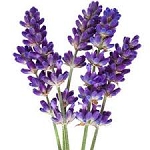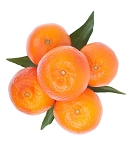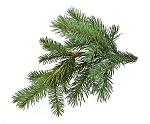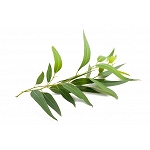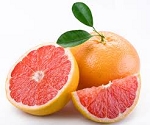A-Z Of Essential Oils
By Heidi McGowan
Angelica (Angelica Archangelica)
Properties - Invigorates the lymphatic system, increases perspiration, cleansing system of toxins. Aids indigestion, flatulence, dyspepsia,
colic. Stimulates appetite. Good For - Provides use as expectorant in colds, bronchitis, pleurisy. Useful for headaches, migraines, and
toothache. Used as a skin tonic, soothing inflammation.
Aniseed (Pimpinella Anisum)
Properties - An antispasmodic, digestive, diuretic, expectorant, invigorating, reviving and uplifting.
Good For - Indigestion, flatulence and muscle spasm.
Blends well with - Bay, cardamom, Cedarwood, coriander, fennel, mandarin, Petitgrain and rosewood.
Mood - Relaxing
How To Use - Massage
Cautions - May irritate sensitive skin. Do not use if pregnant.
Basil (Osimum basilicum)
Properties - Antiseptic, decongestant, warming.
Good For - Effective with headaches and migraines. Antiseptic to the respiratory tract and used for sinus congestion, asthma, bronchitis,
emphysema, and influenza. Restores sense of smell due to catarrh. Also antiseptic to digestive and urinary tracts, and therefore finds
application with digestive disorders, vomiting, gastric spasm, nausea, and dyspepsia. Useful with deep massage to ease muscular pain and spasm
and to stimulate blood flow.
Skin: Tonic to congested skin.
Blends Well With - Bergamot, chamomile, citronella, clary sage, geranium and lemongrass.
Mood - Refreshing and invigorating.
How To Use - Inhalation, bath and massage
Cautions - Can cause skin irritation therefore use in low concentrations. Do not use if pregnant.
Bay (Laurus Nobilis)
Properties - Analgesic, antiseptic, astringent, promotes menstruation, stimulant, and settles upset stomach.
Good For - Respiratory problems, indigestion, rheumatism.
Blends Well With - Coriander, eucalyptus, geranium, juniper, lavender, rose, rosemary and thyme.
Mood - Warming
How To Use - Inhalation, bath and massage
Cautions - Do not use in facial steams. Do not use if you are pregnant.
Benzoin (Styrax Benzoin)
Properties - Soothing sedative, antiseptic.
Good For - Inflamed/ irritated skin and throat infections.
Blends Well With - Citrus oils, cypress, frankincense, jasmine, lavender, myrrh, petitgrain and rose.
Mood - Uplifting and warming
How To Use - Massage and inhalation
Cautions - Skin irritant.
Bergamot (Citrus bergamia)
Properties - Cooling, refreshing, uplifting, antiseptic, deodorising, pain relieving and sedative.
Good For - Can be used as an aid to digestion and as an appetite stimulant. It soothes muscles and can be used in the bath, in a diffuser, as
skincare and with massage.
Blends Well With - Other citrus oils, chamomile, coriander, pine, lavender, Neroli and rosemary.
Mood - Uplifting
How To Use - Inhalation and bath
Cautions - Avoid using before sunlight.
Black Pepper (Piper nigrum)
Properties - Dilates and increases circulation of local blood vessels providing use for muscular aches and stiffness. It is an acrid
digestive, increasing flow of saliva and stimulating appetite. It is also a warming digestive, expelling wind, and promoting gastric motility and
function Finds use with rheumatoid arthritis and temporary paralysis of limbs. Restores tone to the colon muscles. Promotes urine and stimulates
the kidneys. Its warming action also aids respiratory illnesses involving cold, as it is antiseptic to the lungs.
Good For - Muscle spasm, useful for treating bruises.
Blends Well With - Bergamot, cypress, frankincense, geranium, grapefruit, rosemary, sandalwood, and Ylang Ylang.
Mood - Warming
How To Use - Massage
Cautions - Use in low doses. May irritate sensitive skin.
Cajeput (Melaleuca Leucadendron)
Properties - Antiseptic, antiviral, expectorant, carminative and pain relieving.
Good For - respiratory and digestive problems.
Blends Well With - Bergamot, cypress, juniper, lemon, pine and rosemary.
Mood - Relaxing
How To Use - Inhalation, bath and massage
Cautions - Skin Irritant, Avoid during pregnancy.
Cardamom (Elettaria Cardamomum)
Properties - Antiseptic, aphrodisiac, digestive tonic, warming and calming.
Good For - Indigestion,
Blends Well With - Clove, coriander, frankincense, geranium, juniper, lemon, pine, verbena and ylang ylang.
Cautions - skin irritant
Cedarwood (cedrus atlantica)
Properties - As a tonic to the glandular and nervous systems. Its expectorant and drying properties are beneficial to the respiratory tract in
conditions of bronchitis, pneumonia, and coughs with catarrh or excess phlegm. Also provides a tonic effect on the genito-urinary tract where
there is inflammation or burning pain.
Good For - Dry skin, eczema and acne.
Skin - Provides astringent and antiseptic properties that benefit oily skin conditions and may help acne.
Blends Well With - Jasmine, juniper, lavender, lemon, myrrh, neroli, rose and rosemary.
Mood - Soothing
How To Use - Massage, inhalation and skincare
Cautions - Skin irritant. Avoid in pregnancy.
Chamomile (Anthemis nobilis)
Properties - Anti-inflammatory, analgesic and antidepressant.
Good For - Remedying pain associated with the nerves such as neuralgia, headaches, toothache, and earache. Also used for menstrual problems
associated with regulation and pain. Chamomile is renowned for gastrointestinal problems, often bring relieve to those suffering with gastritis,
diarrhoea, colitis, peptic ulcers, flatulence, inflammation of the bowels. Also useful for genito-urinary tract problems. Possibly useful for
liver problems such as jaundice. Chamomile is also renowned for use with skin problems, providing a soothing calming and cleansing action useful
for burns, blisters, inflamed wounds and ulcers.
Blends Well With - Jasmine, lavender, lemon, neroli, palmarosa and rose.
Mood - Soothing
How To Use - Inhalation, compress, bath and massage
Cautions - Avoid in the first three months of pregnancy.
Cinnamon (Cinnamomum Zeylanicum)
Properties - Antiseptic, stimulant, insecticidal and parasitical.
Good For - Nausea and digestive problems.
Blends Well With - Ginger, lemon, orange, pine, rosemary and ylang ylang.
Mood - Warming
How To Use - Massage
Cautions - Skin irritant, avoid in pregnancy. Inhalation can cause irritation.
Citronella (Cimbopogon nardus)
Properties - Renowned for use as an insect repellent. Can help with gastro-intestinal distress including stomach ache and colitis. Its
antibacterial properties find use with intestinal parasites.
Skin: Reported for use with cases of excessive perspiration, oily skin and hair.
Good For - Insect repellent and softens the skin.
Blends Well With - Bergamot, Geranium, Lemon, Orange, Lavender and Pine.
Mood - Refreshing and uplifting
How To Use - Vaporisation and skincare
Cautions - May irritate sensitive skin, avoid use on sensitive or damaged skin. Can cause dermatitis in certain people.
Clary Sage (Salvia sclarea)
Properties - It has a soothing and sedating effect while at the same time strengthens the nervous system. One of the best muscle relaxants
used to relieve cramps and/or muscle pain.
Antidepressant sometimes described as euphoric.
Good For - Stress, hormonal problems and muscle aches.
Blends Well With - Bergamot, cypress, grapefruit, juniper, lavender, lime, pine and sandalwood. Mood - Relaxing and euphoric
How To Use - Inhalation, compress, bath and creams
Cautions - Not for use in pregnancy. Can cause headaches. Avoid with alcohol.
Clove (Eugenia caryophyllata)
Properties - Analgesic, antiseptic, stimulating and warming.
Good For - Scientists have recently found that the oil is high in eugenol, accounting for its antiseptic and analgesic properties. Clove oil is
used in many commercial toothpastes and mouthwashes. French Aromatherapist have found that the anti-inflammatory effects of clove oil have helped
in the treatment of arthritis.
Blends Well With - Basil, black pepper, lemon, peppermint and rosemary.
Mood - Stimulating
How To Use - Massage and skincare
Cautions - Not to be used as a massage oil, and only use in small doses.
Coriander (Coriandrum sativum)
Properties - Renowned for use as an insect repellent. Clears and uplifts. Is applied to fatigue, headache, migraine, neuralgia, and
depression. Reportedly speeds heart beat but has antispasmodic action which can help with gastro-intestinal distress including stomach ache and
colitis. It's antibacterial and vermifugal properties find use with intestinal parasites. Useful with rheumatism and arthritis pain. Reported for
use with cases of excessive perspiration, oily skin and hair.
Good For - Mental fatigue, migraine, tension and nervous weakness. It gives a warm effect on the stomach and can relieve wind and cramps. It is
also helpful for alleviating pain such as rheumatism, arthritis and muscle spasms and useful with colds and flu.
Blends Well With - Bergamot, Cinnamon, Ginger, Grapefruit, Lemon, Neroli and Orange Cautions- Avoid use on sensitive or damaged skin.
Cypress (Cupressus sempervirens)
Properties - Antiseptic, antitoxic, stimulant, digestive tonic and diuretic.
Good For - Its astringent and decongestant properties lend it to uses with excess water and/or perforation leakage such as oedema, haemorrhages,
nose bleeds, heavy menstruation, and incontinence, and generally aids the immune system. Its astringent property coupled with its
vaso-constrictive/styptic property aids with varicose conditions and haemorrhoids. Its antispasmodic action and normalisation effects with
hormones can help pre-menstrual tension and side effects of menopause such as hot flashes, hormone imbalance and irritability.
Skin: Again, astringent effect can benefit wounds and abrasions while its decongestant effects help with oily, over hydrated skin, excess
perspiration, and cellulite.
Blends Well With - Basil, frankincense, geranium and rose.
Mood - Stimulating
How To Use - Massage and skincare
Cautions - Avoid before exposure to sunlight. Avoid if you have high blood pressure.
E- L Of Essential Oils
Eucalyptus (Eucalyptus globulus)
Properties - Cleansing, stimulating, antiseptic, expectorant, antiviral, anti-bacterial and insecticidal. Eucalyptus essential oil is a very
powerful antiseptic and decongestant and has strong disinfectant properties, used commercially today in embrocations and lozenges.
Good For - Eucalyptus oil is useful in treating inflammations, rheumatism, muscular aches and pains and fibrositis. it works well as a
decongestant and as an antiseptic.
Blends Well With - Bergamot, cedarwood, cypress, lavender, lemon, marjoram, pine, thyme and tea tree.
Mood - Refreshing and invigorating
How To Use - Inhalation, compress, bath and creams.
Cautions - Use low concentrations when you are in contact with the sun. Avoid in pregnancy.
Fennel ( Foeniculum Vulgare)
Properties - Anti-spasmodic, expectorant, digestive, diuretic and detoxifying.
Good For - Constipation and menstrual symptoms.
Blends Well With - Basil, geranium, juniper, lemon and rosemary.
Mood - Energising
How To Use - Inhalation, massage and skincare.
Cautions - Avoid in pregnancy or if you suffer from epilepsy.
Frankincense (Boswellia carteri)
Properties - Purifying, warming, antiseptic, astringent and anti-inflammatory.
Good For - Frankincense is an expensive essential oil but it is also an important healer. It rejuvenates skin, so it is used on mature and ageing
complexions and to fade old scars and to reduce inflammation. Its antiseptic qualities are useful in fighting bacterial and fungal skin
infections. The oil works in two ways, it first numbs the nerve endings to reduce pain then boosts the body’s immune system, to accelerate the
healing process.
Blends Well With - All citrus oils, basil, black pepper, geranium, lavender, patchouli and sandalwood.
Mood - Comforting
How To Use - Inhalation and bath
Cautions - Avoid in pregnancy.
Geranium (Pelargonium graveolens)
Properties - Balancing, calming, diuretic, soothing and uplifting.
Good For - Used with pre-menstrual tension and menopausal problems. Said to be helpful with inflammation and congestion of the breasts. Is also
used for circulatory problems including sluggishness, and phlebitis. Reportedly aids sore throats, tonsillitis, asthma, and excess mucus.
Skin: Geranium is known for its beneficial use on the skin. It is considered useful on all skin types. First, it is antiseptic, anti-fungal, and
antibacterial, aiding such conditions as ringworm, and general infections, however it is reportedly useful with acne, burns, bruises, shingles,
herpes, eczema, and dermatitis as well. Second, it is considered to normalise sebaceous gland activity and sebum secretion, benefiting congested
skin as well as dry skin.
Blends Well With - Bergamot, lavender, lemon, neroli, rose and sandalwood.
Mood - Stimulating
How To Use - Inhalation, bath and cream.
Cautions - Can irritate very sensitive skin. Do not use if you are pregnant.
Ginger ( Zingiber officinale)
Properties - Analgesic, antiseptic, stimulant, expectorant and carminative.
Good For - Warming, muscle aches and stomach upset.
Blends Well With - Bay, caraway, cardamom, cedarwood, citrus oils, coriander, eucalyptus, frankincense, geranium, juniper and rosemary.
Mood - Warming and comforting
How To Use - Inhalation, compress, bath and cream.
Cautions - Avoid using in the Bath, can cause irritation to the mucous membranes. May irritate sensitive skin.
Grapefruit ( Citrus Paradisi)
Properties - Antiseptic, anti-toxic, stimulant, digestive tonic and diuretic.
Good For - Helps to relieve the symptoms of Anxiety and depression.
Blends Well With - Basil, bergamot, cedarwood, frankincense, geranium, jasmine, lavender, rose and ylang ylang.
Mood - Uplifting
How To Use - Inhalation and bath.
Cautions - Avoid exposure to sunlight.
Jasmine (Jasminum officinale)
Properties - Antidepressant, emollient, mild analgesic, sedative, soothing, uplifting and a uterine tonic.
Good For - The scent of jasmine sedates the nervous system, so it is good for frayed nerves, headaches, insomnia and depression and for taking
the emotional edge off PMS and menopause. The aroma can also sharpen mental awareness and stimulate brain waves. Jasmine works very well if you
suffer from period pains.
Blends Well With - Clary sage, frankincense, geranium, melissa, neroli, orange, rose and sandalwood.
Mood - Energising and uplifting
How To Use - Inhalation, compress and bath.
Cautions - Do not use if you are pregnant or if you are breast feeding.
Juniper (Juniperus communis)
Properties - Astringent, diuretic, purifying, stimulating and uplifting.
Good For - Juniperberry essential oil has been used to treat urinary infections, for respiratory problems as well as gastro-intestinal infections
and worms. It has been known to treat rheumatism pain and cystitis. Berries and extracts are used in diuretic and laxative preparations, also
veterinary preventatives of ticks and fleas
Blends Well With - Benzoin, cypress, cedarwood, frankincense, geranium, grapefruit, lemongrass, melissa, rosemary and sandalwood.
Mood - Purifying and cleansing
How To Use - Inhalation, compress, bath and creams.
Cautions - May over stimulate the kidneys. Do not use if pregnant.
Lavender (Lavendula vera)
Properties - Analgesic, antiseptic, balancing diuretic, sedative, skin rejuvenating and stress relieving.
Good For - Lavender essential oil is probably the safest of all essential oils and the most antiseptic
This anti-viral and anti-fungal essential oil treats lung, sinus, vaginal and skin infections, reduces inflammation and relieves muscle pain and
headaches. It hastens the healing of skin cells, so it is used on burns, sun-damaged skin, wounds and rashes. Lavender can also act as a sedative
and antidepressant and can reduce the stress that causes asthma flare-ups
Blends Well With - Bergamot. geranium, neroli, peppermint, rosemary sandalwood and thyme.
Mood - Soothing
How To Use - Inhalation, compress, bath and creams.
Cautions - Avoid during the first three months of pregnancy.
Lemon (Citrus Limonium)
Properties - Uplifting, detoxifying, purifying, antiseptic, astringent, immunostimulant and antacid.
Good For - Respiration, circulation and toning.
Blends Well With - Benzoin, cardamom, eucalyptus, ginger, lavender, rose, sandalwood and ylang ylang.
Mood - Invigorating and cleansing
How To Use - Inhalation, skincare and massage,
Cautions - Skin irritant. Avoid using prior to exposure to the sun.
Lemongrass (Cymbopogon citratus)
Properties - Sedative, antidepressant and insecticidal.
Good For - Lemongrass oil is said to be calming and balancing to the nervous system and may increase your powers of concentration. In addition it
is reported to stimulate digestion and milk production in nursing mothers. Aids recovery from illness. Stimulates glandular secretions, liver,
digestion, and appetite.
Blends Well With - basil, cedarwood, eucalyptus, geranium, jasmine, lavender, neroli and rosemary.
Mood - Relaxing
How To Use - Massage and bath.
Cautions - Use in low dilutions. Avoid if you are prone to skin allergy. May irritate sensitive skin.
Lime (Citrus Aurantiifolia)
Properties - Astringent, anti-inflammatory, uplifting, antiseptic and refreshing.
Good For - Can be used for cellulite, high blood pressure, nosebleeds and asthma. Lime oil can be useful to cool fevers associated with colds,
sore throats and flu and aids the immune system. Eases coughs, bronchitis and sinusitis. Lime oil can be used to stimulate and refresh a tired
mind and helps with depression.It has previously been use to treat those suffering with arthritis, rheumatism and poor circulation, and in cases
of obesity and cellulite.
Blends Well With - Citronella, clary sage, lavender and neroli.
Cautions - Avoid before exposure to sunlight.
M-P Of Essential Oils
Marjoram (Origanum marjorama)
Properties - Analgesic, antiseptic, antispasmodic, digestive tonic and a sedative.
Good For - In combinations, marjoram and marjoram oil are used for the stimulation of appetite, to promote digestion,
strengthening of the stomach, for acute and chronic gastritis, as an antispasmodic, for flatulence, for colic-like
nervous gastrointestinal disorders A calming, relaxing oil that can ease muscle spasms, stiff joints, coughing,
indigestion and menstrual cramps. Inhaling marjoram can help to relieve headaches and migraine. The antiviral and
antibacterial properties can help to ward off colds and infections, and its expectorant properties make it a useful oil
to include in steam inhalations for chest infections
Blends Well With - Cedarwood, chamomile, eucalyptus, lavender, mandarin, nutmeg and ylang ylang.
Mood - Warming
How To Use - Inhalation, compress and bath.
Cautions - Can cause drowsiness. Do not use if pregnant.
Melissa ( )
Properties - Anti-allergenic, antidepressant, anti-inflammatory and a digestive tonic.
Good For - Respiration, stress and hormonal disorders.
Blends Well With - Basil, chamomile, ginger, juniper, lemon, neroli, rose and ylang ylang.
Mood - revitalising
How To Use - Bath
Cautions - may cause skin sensitivity. Do not use if you are pregnant.
Myrrh (Commifora myrrha)
Properties - Stimulating, antiseptic, anti-inflammatory, expectorant, sedative, diuretic and
carmanative
Good For - Respiratory and menstrual disorders. Myrrh has an excellent soothing, antiseptic effect on sore or inflamed
gums, mouth ulcers, wounds, and cracked or chapped skin. It can speed the healing of weepy eczema, and because of its
anti-fungal properties can be used as a vaginal wash for thrush or in a footbath for athlete's foot
Blends Well With - Benzoin, clove, cypress, frankincense, geranium, lavender, mandarin, patchouli, pine, sandalwood and
tea tree.
Mood - Stimulating
How To Use - Inhalation and skincare.
Cautions - Avoid in pregnancy.
Neroli (Citrus aurantium)
Properties - Antidepressant, antiseptic, aphrodisiac, deodorant and digestive,
Good For - Neroli provides a tranquillising action on the sympathetic nervous system, which is why it is effective with
stress related problems such as insomnia and depression. It is reportedly effective for neuralgia, headaches, and vertigo
as well. Neroli is also a reported aphrodisiac. Again, this is probably due to its ability to reduce anxiety. Coupled
with its antispasmodic action, it is useful with pre-menstrual tension and some menopausal symptoms such as irritability
and emotional disturbance. Its antiseptic, anti-infectious, antibacterial and emollient properties have been usefully
applied to bronchitis, pleurisy, and pulmonary disease plus chronic diarrhoea, colic, colitis gas and spasm.
Skin: Neroli has pronounced protective and regenerative properties for skin cells, improving elasticity and conditions
such as thread veins, scar tissue and stretch marks
Blends Well With - Citrus oils, coriander, geranium, jasmine, rose and ylang ylang.
Mood - Uplifting and euphoric.
How To Use - Inhalation, massage, compress and bath.
Cautions - Has a short shelf life.
Nutmeg ( Myristica Fragrans)
Properties - Analgesic, antispasmodic and antiseptic.
Good For - Nutmeg oil can stimulate the heart and circulation, activate the mind and revive fainting spells.It is useful
on the digestive system for flatulence, nausea, chronic vomiting, bad breath and indigestion; it encourages appetite and
averts constipation.Nutmeg oil can be useful with scanty periods, frigidity, and impotence and can aid births by
strengthening contractions.Its warming qualities can help with muscular aches and pains, arthritis, gout and especially
chronic rheumatism.
Blends Well With - Black Pepper, clove, lavender, lemon, lime, orange, patchouli, rosemary and tea tree.
Mood - Stimulating.
How To Use - Inhalation and bath.
Cautions - Toxic in high doses.
Orange ( )
Properties - Restores balance to dry or oily skin. It maintains healthy youthful skin by promoting the
production of collagen. Reduces puffiness and discourages dry wrinkled skin. Stimulates circulation to the skin surface
and softens rough skin. Clears blemishes and improves acne-prone skin. It improves cellulite, which is sometimes called
orange-peel skin. Good for ageing, dry skin, and dermatitis. Balances the emotions, either relaxing or stimulating as
needed. It revitalises and energises when boredom and lethargy set in. It has a warm, happy and light influence that
prevents extreme seriousness. It calms the nerves and can combat anxiety and insomnia. Orange oil brightens gloomy
feelings, dissipates depressing thoughts and subdues tension and stress, particularly in wintertime or if the stress is
related to premenstrual syndrome or menopause.
Good For - Respiratory problems and also as a moisturiser for oily skin. Relaxing and calming your mood. Great on
cellulite.
Blends Well With - Frankincense, sandalwood, lavender, rosemary, ylang-ylang
Mood - Calming
How To Use - Massage, bath and skincare.
Cautions - Avoid applying to skin before sun exposure.
Palmarosa (Cymbopogon Martini)
Properties - Antiseptic, antiviral, circulation stimulant, refreshing, cooling, nervous tonic,
tonifying and uplifting.
Good For - Reduces temperature, a digestive tonic, stimulates the appetite, hence making it effective for those suffering
from anorexia nervosa. Has been known to ease stiff joints. Helps to reduce wrinkles. Great for dry skin.
Blends Well With - Bergamot, citronella, geranium, jasmine, lavender, lime, orange, rosewood, sandalwood and ylang
ylang.
Cautions - Avoid in early pregnancy.
Patchouli (Pogostemon Cablin)
Properties - Calming, sedative, antidepressant and digestive tonic.
Good For - Works well as an aphrodisiac and assists in the healing of damaged skin. Blends Well With - Bergamot,
frankincense, geranium, galbanum, ginger, rose, rosewood and sandalwood.
Mood - Soothing and sensual.
How To Use - Skincare and massage
Cautions - None
Peppermint (Mentha piperita)
Properties - Cooling, detoxifying, antiseptic, deodorising, decongestant, nerve tonic and
calmative.
Good For - Digestive disorders and cooling sore feet. Flatulence, prevention of travel/motion sickness. Tones the liver,
intestines and nervous system. Peppermint oil is also used as a painkiller, beneficial for toothache, headache and
migraines
Blends Well With - Benzoin, black pepper, cedarwood, lemon, marjoram, pine, rosemary and sage.
Mood - Refreshing
How To Use - Inhalation, creams, compress and bath.
Cautions - Avoid in pregnancy.
Petitgrain (Citrus aurantium)
Properties - Sedative, antidepressant and antispasmodic.
Good For - Anxiety, insomnia and skincare. Petitgrain oil strengthens and tones the nervous system and can be used to
soothe many stress-related problems such as nervous exhaustion and insomnia. Gently antiseptic can be used to help
control excessive perspiration and acts as a deodorant. As an antispasmodic can help relieve dyspepsia and flatulence
Blends Well With - Bergamot, cedarwood, clary sage, geranium, lavender, melissa, neroli, orange, rosemary and
sandalwood.
Mood - Uplifting and cleansing
How To Use - Inhalation, skin and hair care.
Cautions - None.
Pine (Pinus palustris)
Properties - Antiseptic
Good For - Apart from its renowned antiseptic properties Pine essential oil has also been used to treat arthritis,
muscular aches and pains, poor circulation, rheumatism, stiffness, asthma and bronchitis .Pine oil encourages the
elimination of toxins from the skin, making it useful for clearing dull dry skin as well as acne. It improves oily scalp
conditions, dandruff and seborrhea. As an insect repellent, it protects against bug bites. It also reduces excessive
perspiration.
Mood - Stimulating
How To Use - Skincare, massage and inhalation.
Cautions - May irritate sensitive skin.
R-Z Of Essential Oils
Rose (Rosa damascena)
Properties - Antidepressant, aphrodisiac, liver tonic, menstrual regulator, rejuvenator and a
sedative.
Good For - Rose oil is reputed to have an affinity with the female reproductive system, helping to regulate the menstrual
cycle and alleviate PMS or post-natal depression. It is also a powerful antiseptic against viruses and bacteria, and
regulates the appetite and prevents and relieves, digestive spasms, constipation and nausea . Effective on dry skin.
Blends Well With - Frankincense, geranium, jasmine, lavender, neroli, patchouli and sandalwood.
Mood - Uplifting.
How To Use - Inhalation, cream and in the bath.
Cautions - Avoid in pregnancy.
Rosemary (Rosemarinus officinalis)
Properties - Anti-inflammatory, antiseptic, astringent, soothes nerves, stimulant and a tonic.
Good For - Because of its stimulating qualities rosemary oil may be used to combat mental and physical fatigue. It is
current in the British Herbal Pharmacopoeia as a specific for 'depressive states with general debility and indications of
cardiovascular weakness'
Blends Well With - basil, lavender, lemon, peppermint, pine and sandalwood.
Mood - Invigorating.
How To Use - Inhalation, creams, compress and bath.
Cautions - Avoid in pregnancy or if epileptic
Sage (Salvia officinalis)
Good For - Fever, appetite stimulant and easing joint pain.
Blends Well With -
Mood - Astringent, cooling.
How To Use - Inhalation and massage
Cautions - Use with care, contains thujone which is an oral toxin. Do not use if pregnant, epileptic or have high blood
pressure. A milder alternative is Clary Sage
Sandalwood (Santalum album)
Properties - Anti-inflammatory, aphrodisiac, relaxing, respiratory clearing, sensual and soothing.
Good For - The fragrance of sandalwood oil can help lift depression and banish feelings of anxiety and lack of sexual
desire. It is also effective for respiratory conditions such as bronchitis, dry coughs and sore throats. Sandalwood
encourages skin rejuvenation and has been used for wound healing, dry or chapped skin, acne and psoriasis
Blends Well With - Bergamot, frankincense, geranium, jasmine, juniper, lavender, rose and ylang ylang.
Mood - Relaxing, soothing and sensual.
How To Use - Inhalation, creams, compress and bath.
Cautions - None
Tea tree (Melaleuca alternifolia)
Properties - Antiviral, antibacterial, anti-inflammatory, immuno-stimulant, stimulating.
Good For - Tea tree essential oil can be used for a wide range of skin problems, such as athletes foot, acne, burns, cold
sores, dandruff, insect bites warts and infected wounds. Has also been used for colds, flu, and other infectious
illnesses such as chicken pox
Blends Well With - Clary sage, clove, lavender, nutmeg, rosemary and ylang ylang.
Mood - Cleansing
How To Use - Inhalation, creams, compress and bath.
Cautions - May irritate sensitive skin.
Thyme (Thymus vulgaris)
Properties - Antidepressant, antibacterial, diuretic and warming.
Good For - Thyme essential oil is an antiseptic and antibiotic, disinfectant and strong germicidal, it is valuable for
all infections, especially gastric and bladder infections. Its anti-rheumatic and anti-toxic properties are beneficial in
treating arthritis, gout and cellulite. Thyme stimulates the immune system to effectively fight off colds, flu and
catarrh
Blends Well With - Bergamot, chamomile, eucalyptus, juniper, lavender, lemon, marjoram, rosemary, sage and tea tree.
Mood - Uplifting
How To Use - Bath and Inhalation
Cautions - Avoid during pregnancy. Use in small doses.
Vetivert
Properties - Calming therefore useful in cases of anxiety, shocks, stress and tension
Good For - Used to to ease aches and pains, cramp and stiffness
Mood - Relaxing
How To Use - Inhalation, bath and massage
Cautions - None
Ylang Ylang (Canaga odorata)
Good For - Used to slow fast breathing (hyperpnea) and for palpitations of the heart, tachycardia, and to lower blood
pressure. Reported to balance the hormone, stimulate the thymus gland, and is used for the reproductive system as a tonic
for the uterus and to provide a feeling of warmth and togetherness. Also used to balance diabetes. Ylang Ylang is
reported to be beneficial in firming the breasts. It is renowned for its aphrodisiac and antidepressant qualities, and as
such is used for impotence and frigidity. It provides an antiseptic action to the intestines to aid in infection and
diarrhoea. Ylang Ylang balances sebum production and therefore finds application for both oily and dry skin. It was used
by the native population of Comoros to stimulate the scalp promoting a more luxurious hair growth. It is also used for
acne, insect bites and as a fragrance.
Blends Well With -
Mood - Calming and sensual
How To Use - Inhalation, creams, bath and massage.
Cautions - avoid use on sensitive or damaged skin, use very highly diluted
|
|

